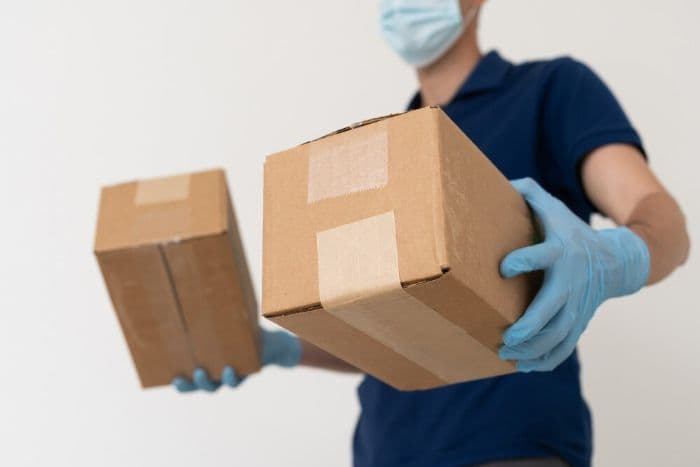Managing medical courier services goes far beyond speed. Healthcare organizations need strict HIPAA compliance, transparent pricing, and centralized oversight to avoid fragmented billing, unexpected surcharges, and the risks of relying on non-specialized messengers. When these elements are missing, courier operations quickly become a source of friction rather than support.
This is a high-stakes environment. A nationwide survey published by the American Nurse Journal found that 71% of nurses say courier delays impact their daily work, with delivery errors contributing to workflow disruption and staff stress. In healthcare settings, courier issues are felt immediately across care teams.
In this article, we break down five common yet often overlooked mistakes healthcare organizations make when managing medical courier services, and share practical ways to avoid them to regain control, reduce operational friction, and support more reliable healthcare operations.
Table of Contents:
- Mistake #1: Fragmented Shipping Accounts & Uncontrolled Spending
- Mistake #2: Ignoring Hidden Fees
- Mistake #3: Neglecting HIPAA and Compliance Protocols
- Mistake #4: Lack of Real-Time Tracking and Visibility
- Mistake #5: Not Verifying the Coverage Area of Your Medical Courier Company
- How to Choose a Reliable Medical Courier Service?
- How Airpals Helps Healthcare Organizations Avoid These Common Medical Courier Mistakes
- Key Takeaways
- Conclusion: Improving Your Medical Courier Experience
- Frequently Asked Questions
Mistake #1: Fragmented Shipping Accounts & Uncontrolled Spending
Many healthcare providers make the mistake of allowing multiple departments to manage shipping accounts independently. Different employees might create redundant accounts with various medical courier sites, resulting in scattered and difficult-to-track expenses.
Some may even share account numbers informally, leading to unauthorized or personal shipments that slip through the cracks. The result is uncontrolled parcel spend and billing chaos. Important data is scattered across multiple invoices, making it difficult for finance teams to track shipments, identify discrepancies, and uncover opportunities for cost savings.
The Fix: consolidate and centralize. In practice, centralization means you replace “dozens of FedEx accounts floating around” with one unified invoice and spend dashboard. With all shipments visible in one place, finance teams can monitor costs in real-time, set clear usage policies, and leverage total volume to negotiate discounted rates.
Mistake #2: Ignoring Hidden Fees
When selecting a medical courier service, providers often focus on base pricing without thoroughly reviewing hidden fees like fuel surcharges, after-hours delivery fees, tolls, or special handling charges.
Hidden fees not only inflate costs, but they also erode trust between a healthcare provider and the courier service. Transparency is key in any business partnership, and medical logistics is no different.
The Fix: transparency and actively audit. When selecting a medical courier service, ask for a detailed breakdown of fees. Ensure they disclose any surcharges for fuel, special handling, insurance, or anything beyond the base rate. Couriers that pride themselves on honesty will be upfront about their pricing.
Mistake #3: Neglecting HIPAA and Compliance Protocols
In healthcare logistics, compliance isn’t optional; it’s mandatory. HIPAA (Health Insurance Portability and Accountability Act) regulations require that any handling of Protected Health Information (PHI), whether documents, lab results, or patient samples linked to personal data, is done securely and confidentially.
A report by carGO Health points out that delivery errors can lead to delayed treatments, additional costs, and even compromised patient outcomes. Their findings highlight how small lapses in protocol, like missing documentation or poor handoff procedures, can create costly chain reactions across hospital operations.
The Fix: vet your medical courier’s compliance credentials as carefully as you’d vet their pricing and speed. Always ask if the courier service is HIPAA-compliant and what protocols they follow to maintain privacy and security.
Mistake #4: Lack of Real-Time Tracking and Visibility
A delayed lab sample or mishandled delivery isn’t just a minor hiccup; it can disrupt patient care and lead to unexpected, significant costs. As Mark Speight, COO at Caduceus Medical Logistics, notes in HPN, same-day medical delivery is like a hospital’s circulatory system; any disruption “can have severe consequences, costing both tears and treasure.”
The Fix: Modern medical courier companies should provide live GPS tracking, online dashboards, and instant ETA notifications via email or SMS to keep teams informed and reduce downtime.
At Airpals, we've elevated tracking transparency with our innovative Sharable Tracking Page feature. Our users can effortlessly generate secure, public URLs displaying essential shipment information such as pickup and drop-off addresses and real-time order statuses, without revealing sensitive details like names, phone numbers, or package contents. This helps healthcare teams privately inform labs, patients, and internal stakeholders with ease.
Mistake #5: Not Verifying the Coverage Area of Your Medical Courier Company
Choosing a “medical courier near me” can be convenient for local runs, but if you fail to verify the courier’s full coverage area and capabilities, you might be setting yourself up for service gaps. Not all medical courier companies can reach every location you might need, especially if your operations span multiple cities or states.
The costly mistake here is assuming your courier can go everywhere you do, without actually confirming it. You may end up juggling multiple courier services for different regions, which reintroduces the fragmentation and complexity issues from Mistake #1, or suffering delays when a shipment falls outside your courier’s territory.
The Fix: align your choice of courier with your geographic footprint and growth plans. If your healthcare network operates in multiple states or is planning to expand, you’re usually better off partnering with a nationwide medical courier service or a provider with a broad network.
How to Choose a Reliable Medical Courier Service?
If you are searching for medical courier services near me, remember that reliability goes beyond proximity. In healthcare logistics, a dependable medical courier supports compliance, visibility, and operational continuity, not just fast pickups.
Start with technology. A reliable medical courier service should integrate smoothly into your existing workflow, offering centralized dashboards, real-time tracking, and clear visibility across all shipments. Without this foundation, teams are left reacting instead of staying in control.
Next, evaluate specialized training. Understanding what a medical courier is means recognizing they act as an extension of your clinical operations. Couriers handling medical shipments must be trained to follow healthcare protocols, protect sensitive information, and manage time-critical materials with consistency.
Finally, look for a one-stop solution. The best medical courier service providers can support both same-day local deliveries and broader transport needs as your organization grows. Consolidating services under a provider that can scale reduces vendor sprawl, simplifies billing, and removes unnecessary administrative work.
How Airpals Helps Healthcare Organizations Avoid These Common Medical Courier Mistakes
So, what does the ideal solution look like? The five mistakes outlined above underscore a need for a comprehensive approach to medical courier services, one that combines local agility with big-picture oversight. This is exactly the gap that Airpals was designed to fill.
Airpals is a tech startup that helps healthcare organizations avoid these common pitfalls by offering both reliable same-day courier service and a powerful parcel management platform.
Airpals Concierge: Your Partner in Medical Courier Services
For urgent local deliveries and pick-ups, Airpals Concierge provides a dependable, on-demand solution. Airpals has a network of vetted medical couriers and logistics partners in over 100 U.S. cities, ready to handle healthcare shipments with speed and care. This network includes major healthcare and biotech hubs such as Boston, New York, Philadelphia, the San Francisco Bay Area, Chicago, Miami, and the Research Triangle, among others.
What does this mean for you? It means that whether you need to send a specimen across town or get a critical piece of equipment to a clinic on the other side of the state, Airpals likely has a medical courier near you who can pick it up and deliver it the same day. You’re not limited to one city or forced to juggle multiple “local” couriers for different regions; Airpals coordinates it all under one service.
Centralized Parcel Management and Cost Control
Airpals isn’t just a courier service; it also provides a centralized parcel management platform that serves as a single command center for all your shipping activities.
Healthcare organizations can centralize every shipping account, whether it’s FedEx, UPS, or same-day services, into a single system that offers unified billing, real-time visibility, and role-based access. By eliminating scattered accounts and replacing them with a centralized, intelligent workflow, Airpals helps teams take back control of their shipping spend while reducing back-office workload.
In fact, businesses using Airpals have been able to cut shipping costs by up to 20% annually by reducing costly errors and consolidating their carrier usage.
Key Takeaways
- Fragmented shipping accounts create chaos; centralize for full cost visibility and better control.
- Hidden fees are budget killers; demand transparent pricing and audit invoices regularly.
- HIPAA compliance is non-negotiable; always choose a courier trained to handle PHI securely.
- Real-time tracking isn't optional; lack of visibility delays care and adds risk.
- Limited coverage can halt operations; verify that your medical courier company supports all your key regions.
- Use integrated courier solutions like Airpals for optimal reliability, compliance, and cost management.
Conclusion: Improving Your Medical Courier Experience
In healthcare, avoiding common medical courier mistakes is essential to protect patient care and maintain operational efficiency. Issues like fragmented accounts, hidden fees, compliance oversights, and limited visibility can quietly drain time and resources if not addressed properly.
If you recognize any of these mistakes in your current process, now is the time to address them. The good news is, solutions like Airpals are readily available to help healthcare and pharma organizations modernize their logistics.
Contact Airpals today to learn how our same-day courier network and parcel management platform can help your team stay compliant, save time, and reduce shipping costs.

Frequently Asked Questions
What is a medical courier?
A medical courier is a trained logistics professional who transports sensitive healthcare items such as lab specimens, pharmaceuticals, and patient records. Unlike standard couriers, medical couriers follow strict regulatory and safety requirements, including HIPAA compliance, to ensure secure and compliant handling.
How to choose a reliable medical courier service?
Choose a medical courier service that offers HIPAA compliance with a signed BAA, real-time tracking, trained drivers, and transparent pricing. Reliable providers combine operational visibility, regulatory compliance, and clear billing to support healthcare workflows without hidden costs.
How do I find a medical courier company near me?
To find a medical courier company near you, look for services that offer HIPAA compliance, real-time tracking, and coverage in your city or region. Platforms like Airpals operate in 100+ U.S. cities, making it easy to find a vetted courier solution wherever you are.
What makes medical courier services different from regular delivery services?
Medical courier services differ from regular couriers by handling time-sensitive, regulated materials like lab specimens or PHI with certified training and compliance protocols.
Why is HIPAA compliance critical when choosing a medical courier?
HIPAA compliance in medical courier services ensures secure handling of patient data, reducing legal risks, protecting privacy, and maintaining trust with healthcare providers.
How does Airpals’ parcel management platform help prevent common medical courier mistakes?
Airpals prevents common medical courier mistakes by offering centralized parcel management, real-time tracking, shareable tracking links, and HIPAA-compliant delivery in over 100 U.S. cities.




